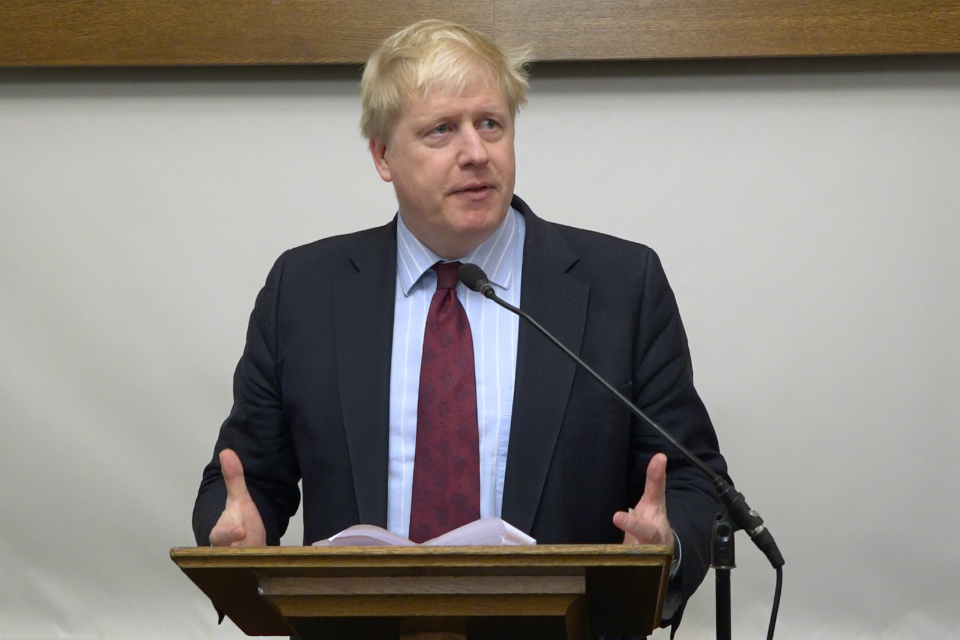Ending the ivory trade: Foreign Secretary's speech
Foreign Secretary Boris Johnson praised China's decision to close down its domestic ivory market at an event on the illegal ivory trade, hosted by WWF.

Good afternoon everybody, good afternoon ladies and gentlemen.
It’s one of my themes at the moment that we don’t do enough to celebrate good news and today particularly is a moment for celebration. Because China has struck a blow against elephant poachers by closing down its domestic ivory market, which is currently the largest in the world.
And provided that ban is fully enforced, and provided the ivory trade isn’t allowed simply to relocate to Vietnam or Laos or Burma or indeed anywhere else – and I’m afraid there are warning signs that that is already happening – then China’s enlightened and far-sighted decision will give humanity a better chance of halting and eventually reversing the tragic decline of the African elephant.
And this has really come in the nick of time. I first went to Africa 40 years ago as a child, and I remember seeing great herds in the Serengeti and the Maasai Mara and I was even trapped in a latrine I seem to remember for about an hour.
Anyway, more than 2 thirds of those animals are now gone. Africa is down to 415,000, even at the most generous count, and in the last 12 years the pace of slaughter has accelerated. We have lost 110,000 since 2006, including half of all the elephants in East Africa; 2 thirds in Tanzania.
It would be absolutely unconscionable to sit back and watch, as though we were powerless or indifferent to the disappearance of charismatic megafauna in Africa.
If we do nothing, there really is a risk that our grandchildren will grow up in a world without wild elephants and if that calamity were to come about, they will look at these photographs of giant herds, and they will point accusing fingers at all of us and ask you and me – why we were so careless and neglectful as to let this happen. And why we failed to save the African elephant from extirpation?
And it is a terrible fact that our planet is now enduring what may be the sixth mass extinction of species. Unlike previous extinctions - –homo sapiens were not around for the previous 5, so we can’t take the blame for those – but this particular one.
In the last century, 500 species have vanished from the earth, and if nature was allowed to take its course – then the normal rate of extinctions over a hundred years would be only 2 species.
So there is nothing inevitable, nothing biologically preprogrammed, about the tragedy taking place around us. On the contrary, we can protect our planet from being despoiled, and we can rescue wildlife from destruction. The only question is whether we have the collective will?
And I believe that today is a manifestation of that will.
I think it is great that the UK and China are united in our perspective on this policy – and by the way, I think we’re more forward looking and ambitious in our ban than the European Union itself, about which I make no complaint except they have a President called Tusk so you would have thought they would be sympathetic on this ban – the UK and China together are taking this forward.
And we in London, in October, we will be co-hosting with Defra, with other departments, an international conference on combating illegal wildlife trade which threatens the survival of many, many endangered species; pangolins, rhinos, tigers, and many more.
And whilst I’m on the subject of ivory, don’t forget, as we work to save the elephant, the threat then moves across to the hippo, and the narwhal, and other bearers of ivory in their jaws.
And so I am very glad to say that earlier today also that the Hong Kong Legislative Council voted to end the Territory’s ivory trade by 2021, with no compensation for dealers.
I think we should all be very encouraged from China’s decision not only because of the practical impact we hope it will have, but because it demonstrates the birth of a new global consensus – based on the collective will of the United Nations – that buying or selling ivory is no longer acceptable anywhere and human beings, wherever we may live, share the same obligation to do what we must to protect the magnificent animals that are humanity’s joint inheritance.
Thank you.
Find out more about UK-China action to end the illegal wildlife trade.
Further information
-
Follow the Foreign Secretary on Twitter @BorisJohnson and Facebook
-
Follow the Foreign Office on Twitter @foreignoffice and Facebook
-
Follow the Foreign Office on Instagram, YouTube and LinkedIn